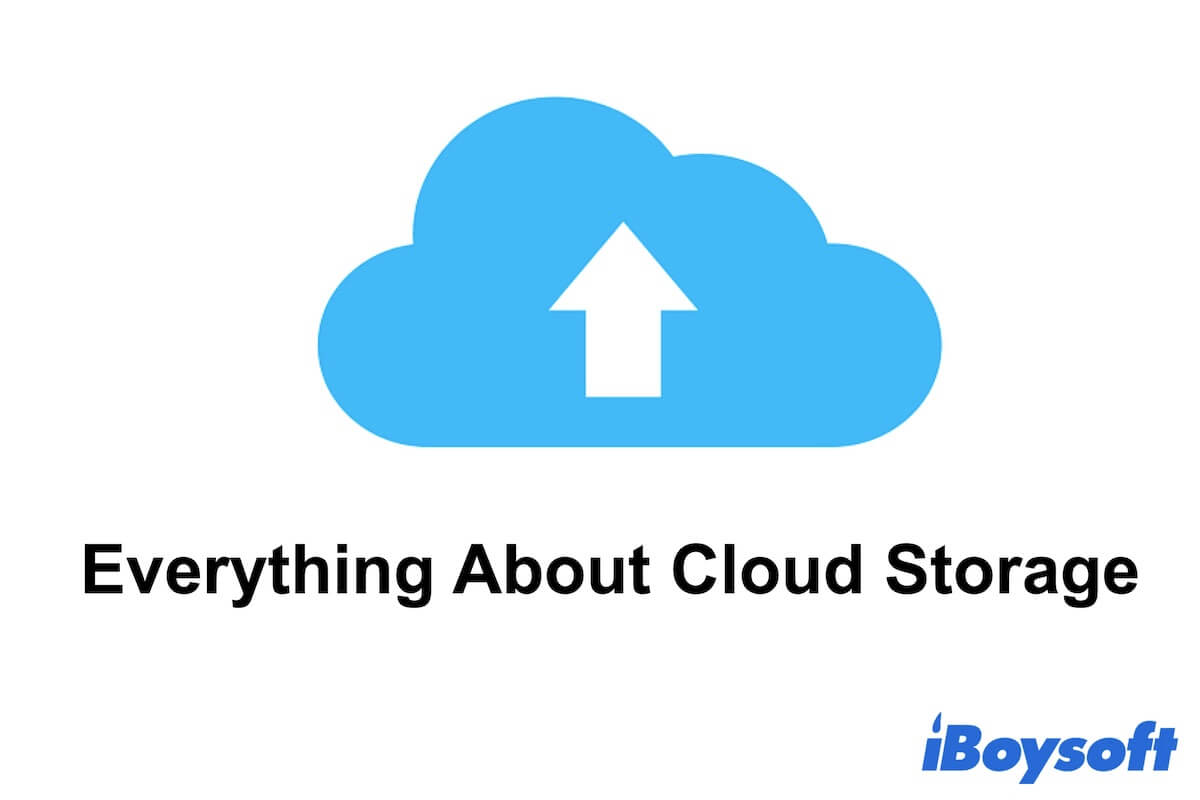If you've heard about cloud storage from others and are considering using it to store your files, read this post to get full learning of it.
What is cloud storage?
Cloud storage is an online data storage service that allows you to store data on remote storage systems. And the data stored in cloud storage can be accessed at off-site locations at any time, giving you more convenience in data sharing and maintenance.
Usually, the cloud storage service is offered by third-party providers like iCloud who host and manage the servers and related infrastructure to keep the security of your data and ensure the authenticated access to the stored data in time. The daemon that works with cloud storage on Mac is called fileproviderd.
How does cloud storage work?
Different from storing data on a physical storage device like an external hard drive, cloud storage doesn't require you to prepare a hardware device. It uses the cloud computing algorithm to store digital data in logical pools on servers through the network, which we said 'the cloud'. And the servers are virtual machines that are hosted on physical servers located at different places.

After you've chosen a cloud storage provider, it will allow you to connect to their cloud storage through the internet or other private connection channel. Then, the data you stored on the specific cloud storage will be transmitted and stored on the remote servers supplied by the provider. And the provider takes responsibility for the security, capacity, data accessibility, and other aspects of the data storage.
Every time when you need to access your stored data or prepare to save more files onto the cloud storage drive, the provider will verify your identification. The common way is to check the correctness of the account and password of the customer.
Types of cloud storage
There are four types of cloud storage, including public cloud storage, private cloud storage, hybrid cloud storage, and community cloud storage.
Public cloud storage
It is a cloud storage service model that different organizations or companies on a pay-per-use basis to store and sync data to the same remote server. It is usually charged on a per-GB-per-month model and opened to all users around the world.
Private cloud storage
The infrastructure and services of the cloud computing model are hosted within an organization's own data center and privately used by itself. It is suitable for an organization that handles private files and greatly reduces the risk of data exposure.
Hybrid cloud storage
It combines the features of public cloud storage and private cloud storage. Using hybrid cloud storage, the essential files are saved into the organization's private cloud while the other unnecessary data is kept in the public cloud.
Community cloud storage
This model is designed for kinds of organizations in the same community and the stored data is open to any organization in this community. Different from public cloud storage, the stored data is only shared with the community member.
Advantages and disadvantages of cloud storage
Cloud storage brings many benefits in cost, data sharing, data maintenance, and more. But every coin has two sides, cloud storage also exists disadvantages. Let's take a comparison of the advantages and disadvantages of cloud storage to make it clear whether it is worth using cloud storage.
- Pros:
- Cost savings
- Quick accessibility
- Fast data syncing
- Easy data sharing
- Cons:
- Risk of privacy exposure
- Network oriented
The advantages of cloud storage
Cost savings. Compared with buying a physical storage device like a USB flash drive, the cloud storage per GB costs less money than using physical devices.
Quick accessibility. You can access files stored on cloud storage in any place and at any time. You don't need to carry the external storage device everywhere and access the data before connecting it to a computer.
Fast data syncing. If you use a physical storage device, it is complex and time-wasting for you to update the changed files. But cloud storage enables automatic data syncing once it checks data changes.
Easy data sharing. Cloud storage allows you to share some documents or other files with schoolmates or colleagues in different places within seconds. Users who have the accounts with cloud storage can log in off-site and access shared data.
The disadvantages of cloud storage
Risk of privacy exposure. Though the cloud storage provider promises the security of your data. But since the data you are stored online, it faces the risk of exposure to malware attacks or illegal stealing by hackers.
Network oriented. Successful cloud storage is based on a stable network connection. If the network is broken suddenly, the edited data on the cloud storage will fail to be saved.
Related posts:
• The best backup software for Mac
FAQ about cloud storage
- Q1. What is cloud storage used for?
-
A
Cloud storage is used to store data online and manage and maintain it at off-side locations.
- Q2. Is the cloud storage free?
-
A
Not completely. Some cloud storage providers like iCloud, Google Drive, Dropbox, Box, etc. offer a limited storage capacity for free. If you need to save more data, an upgrade subscription is required. And the price for different subscription plans varies according to the capacity. Usually, the larger capacity of the plan, the higher price it asks for.
